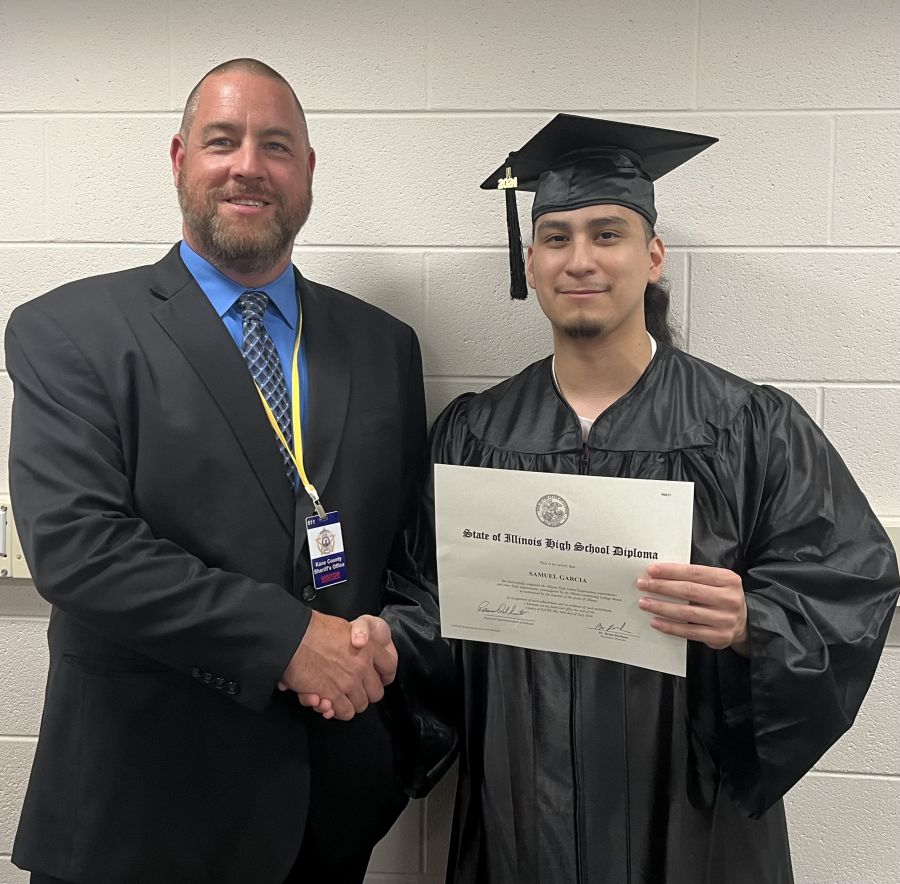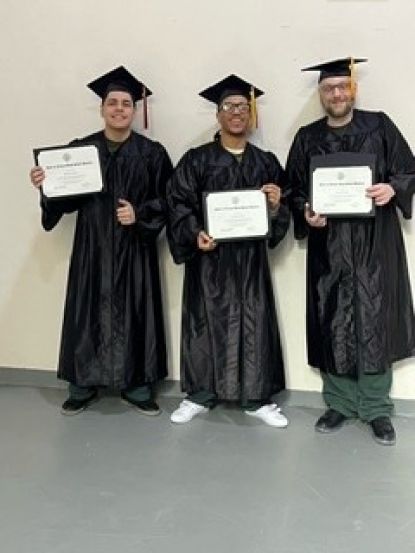


Waubonsee Community College celebrated a significant milestone, recognizing six graduates—Getzuri Arellano, Samuel Garcia, Ryan Howard, Jesus Canales, David Williams, and James Johnson—who earned their State of Illinois High School Diploma while enrolled in High School Equivalency classes held in Kane County Jail. This achievement highlights Sheriff Ron Hain’s and Waubonsee Community College’s commitment to helping justice-involved individuals gain access to life-changing educational opportunities, which leads to safer communities, lowers recidivism rates, and increases the employability of those who participate.
The partnership between Waubonsee Community College and the Kane County Sheriff’s office was built and launched in August 2019 to provide instructional services for individuals currently residing in Kane County Jail. It follows a national trend towards providing educational opportunities to incarcerated individuals to obtain the necessary skills and knowledge to enter high-demand employment fields upon release. Since its inception, the program has served 580 individuals residing at the jail.
Waubonsee’s High School Equivalency classes offer instruction in math, science, social studies, language arts, government, and U.S. civics. These classes prepare students to take and pass all sections of the GED® or HiSET exam, leading to the State of Illinois High School diploma.
"Adult Education in a corrections setting works! It is shown to reduce recidivism and give individuals an opportunity to put their background behind them and move forward," said Adam Schauer, Dean for Adult and Workforce Education at Waubonsee Community College.

A 2023 study by the Mackinac Center for Public Policy reported that the overall return on investment for education programs in a correctional setting for taxpayers is 122%, factoring in the costs of the program versus the savings from reduced recidivism, increased employment opportunities, and safer communities. Additionally, studies have shown that individuals that participate in education programs have a 43% lower chance of being reincarcerated (recidivism).
The program courses are specifically structured to support students in overcoming the unique challenges of learning in a correctional environment, including limited educational resources such as no access to the internet, the stress of legal uncertainties, separation from loved ones, and limited time to work with the instructor. Despite these obstacles, the program helps students stay focused and motivated, enabling them to overcome these barriers and succeed.

Graduate David Williams reflected on his personal growth, noting, “The language arts classes opened a whole new vocabulary to me and have made my writing so much stronger. I am better able to express myself using new words and having greater understanding of their meaning. The classes also made me want to learn more about subjects and gain knowledge in areas I didn’t know about before. I am looking forward to learning more and growing stronger as an individual. I used to be the poison, now I want to be the antidote in my community!”
Jesus Canales, another graduate, expressed hope for his future, stating, “I see all the opportunities that have opened now that I have my diploma. The better job opportunities and education opportunities that were once closed have now opened and I want to be able to meet my responsibilities after I am released. ‘Difficult roads lead to beautiful destinations.’ It was really hard, but we worked together as a team and kept lifting each other up. Mr. Hargot pushed us not only to learn, but to change the way we looked at the world and the possibilities.”
The program’s success is due to the dedicated Adult and Workforce Education adjunct faculty members Michael Hargot, Beth Ardaugh, John Gutman, and Michelle Vanek. They help students elevate their worldview through cognitive behavior therapy-based curriculum and the transformative power of education.
“Many individuals who once struggled with education have gone on to achieve great things after obtaining their GED [Illinois High School Diploma],” said Hargot. “This demonstrates that with determination and education, there are no limits to what one can achieve. I am passionate about corrections education because I have seen how earning the diploma not only changes the students' lives, but also the lives of their family and children.”
Pictured above: Adam Schauer, Dean for Adult Education and Workforce Education, presented an Illinois High School Diploma to Samuel Garcia. Below: Graduates (left to Right) Jesus Canales, David Williams, and Ryan Howard.

